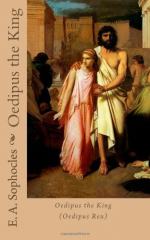|
This section contains 367 words (approx. 2 pages at 300 words per page) |
Oedipus' Royal Road to Ruin
Oedipus comes to Thebes and solves the riddle of the Sphinx. He later boasts "but I, the Oedipus who stumbled here without a hint could snuff her out by human wit"(23). This illustrates that he King is very confident in his knowledge and gift for solving puzzles. He says to the people of Thebes, "Yes, I whom men call Oedipus the Great"(5) because he is so proud of this fact and wants everyone to know. Oedipus' hubris is obvious through the way he sees himself superior to others.
Oedipus considers himself the savior of Thebes. The chorus prays to the gods and Oedipus answers, "You pray! Then listen: what you pray for you can have -- if you hear my plan"(14). Thebes' ruler, Oedipus is angered when the city asks the gods for help because according to him, 'by [him]self and for [him]self [he]'ll break this plague"(11). After solving one of Thebes' problem's, he believes he can solve them all and go against the gods at the same time showing the King of Thebes' excessive pride.
To end the plague, Oedipus begins the search for Laius' murderer. Oedipus accuses Tiresias, the blind, holy prophet of the murder because he refuses to speak. Tiresias warns him that a "flood of sorrows...will pull [him] down and level off [his] pride"(24). The king believes in his own past and cannot accept the word of Tiresias. Oedipus' hubris blinds him of the truth.
The excessive pride of the King of Thebes causes him to lose his place on the throne. Oedipus the King did not realize that there is no escaping the prophecy of Apollo. He was born destined to failure. If he truly fears the gods, he would never kill anyone. Oedipus' harmartia, hubris, steers him down the royal, humiliating road to ruin.
|
This section contains 367 words (approx. 2 pages at 300 words per page) |


